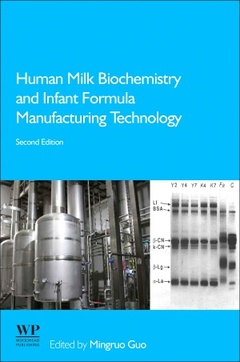Description
Human Milk Biochemistry and Infant Formula Manufacturing Technology (2nd Ed.)
Coordinator: Guo Mingruo
Language: English
Subjects for Human Milk Biochemistry and Infant Formula Manufacturing...:
Keywords
Advantages; Animal origin; Asia-Pacific countries; Bioactive components; Breastfeeding; CAC; Carbohydrate; Caseins; Clinical feeding trial; Component; Composition; Composition changes; Damages; Disadvantages; Distribution; European Union; Expression; Food allergy; Formulation; Functional properties; Gross composition; Growth factors; Guidelines; History; Human milk; Human milk banking; Hypoallergenic; Infant formula; Ingredients; Interactions; Lipid; Lipidomics; Mechanism; Methods of analysis and validation; Microbiome; Microflora; Milk; Minerals; New developments; Nutrient; Oligosaccharides; Omega 3/omega 6; Packaging integrity; Pasteurization; Plant origin; Processing; Protein; Proteomics; Quality control; Quality standards; Quality systems; Regulation; Regulations and standards; Selection; Special needs formula; Storage; Technology; United States; Vitamins; Whey proteins
422 p. · 15x22.8 cm · Paperback
Description
/li>Contents
/li>Biography
/li>Comment
/li>
Human Milk Biochemistry and Infant Formula Manufacturing Technology, Second Edition covers the history of bottle feeding, its advantages and disadvantages when compared with breast-feeding, human milk biochemistry, trends and new developments in infant formula formulation and manufacturing, and best practices in infant formula processing technology and quality control. The book also covers human milk proteomics as a new, separate chapter and provides additional information on infant formula clinical trial guidelines. In addition, the book includes information about the formulation and processing of premature and low birth weight infant formula.
This book is sure to be a welcome resource for professionals in the food and infant formula industry, academics and graduate students in fields like nutrition, food sciences, or nursing, nutritionists and health professionals, government officials working in relevant departments, and finally, anyone interested in human milk and infant formula.
1. Introduction: Trends and issues in breastfeeding and the use of infant formula2. Chemical composition of human milk3. Bioactive components in human milk4. Human milk proteomics and lipidomics and human milk microbiome5. Human milk banking6. Formulation guidelines for infant formula7. Ingredients selection for infant formula8. Processing technology for infant formula9. Component interactions and processing damage during the manufacture of infant formula10. Infant formula quality control11. Infant formula product regulation12. Infant formula analyses13. Infant formula and allergy
- Reviews both human milk biochemistry and infant formula processing technology for broad coverage
- Features a comprehensive review on the human milk protein profile using proteomics technology
- Contains information on infant formula processing technology
- Provides guidelines on infant formula clinical trials and related topics
These books may interest you

Molecular NutritionMother and Infant 193.44 €



